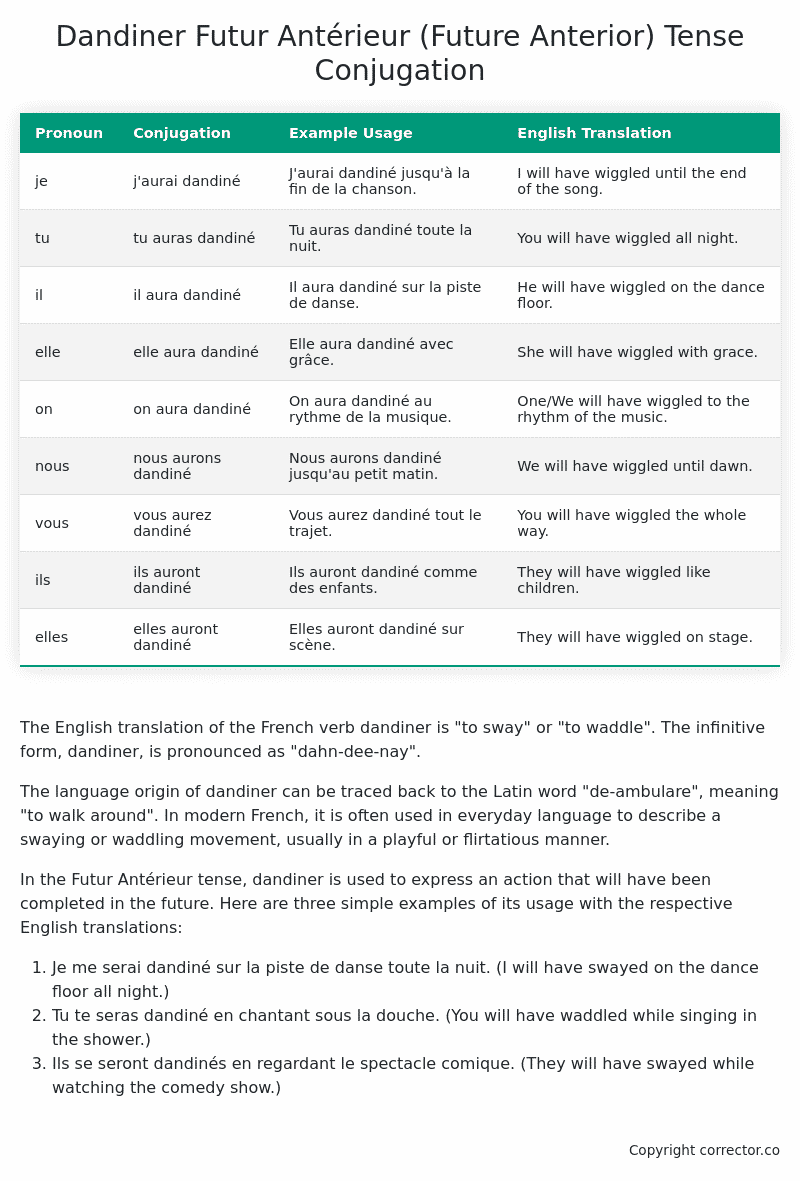Futur Antérieur (Future Anterior) Tense Conjugation of the French Verb dandiner
Introduction to the verb dandiner
The English translation of the French verb dandiner is “to sway” or “to waddle”. The infinitive form, dandiner, is pronounced as “dahn-dee-nay”.
The language origin of dandiner can be traced back to the Latin word “de-ambulare”, meaning “to walk around”. In modern French, it is often used in everyday language to describe a swaying or waddling movement, usually in a playful or flirtatious manner.
In the Futur Antérieur tense, dandiner is used to express an action that will have been completed in the future. Here are three simple examples of its usage with the respective English translations:
- Je me serai dandiné sur la piste de danse toute la nuit. (I will have swayed on the dance floor all night.)
- Tu te seras dandiné en chantant sous la douche. (You will have waddled while singing in the shower.)
- Ils se seront dandinés en regardant le spectacle comique. (They will have swayed while watching the comedy show.)
Table of the Futur Antérieur (Future Anterior) Tense Conjugation of dandiner
| Pronoun | Conjugation | Example Usage | English Translation |
|---|---|---|---|
| je | j’aurai dandiné | J’aurai dandiné jusqu’à la fin de la chanson. | I will have wiggled until the end of the song. |
| tu | tu auras dandiné | Tu auras dandiné toute la nuit. | You will have wiggled all night. |
| il | il aura dandiné | Il aura dandiné sur la piste de danse. | He will have wiggled on the dance floor. |
| elle | elle aura dandiné | Elle aura dandiné avec grâce. | She will have wiggled with grace. |
| on | on aura dandiné | On aura dandiné au rythme de la musique. | One/We will have wiggled to the rhythm of the music. |
| nous | nous aurons dandiné | Nous aurons dandiné jusqu’au petit matin. | We will have wiggled until dawn. |
| vous | vous aurez dandiné | Vous aurez dandiné tout le trajet. | You will have wiggled the whole way. |
| ils | ils auront dandiné | Ils auront dandiné comme des enfants. | They will have wiggled like children. |
| elles | elles auront dandiné | Elles auront dandiné sur scène. | They will have wiggled on stage. |
Other Conjugations for Dandiner.
Le Present (Present Tense) Conjugation of the French Verb dandiner
Imparfait (Imperfect) Tense Conjugation of the French Verb dandiner
Passé Simple (Simple Past) Tense Conjugation of the French Verb dandiner
Passé Composé (Present Perfect) Tense Conjugation of the French Verb dandiner
Futur Simple (Simple Future) Tense Conjugation of the French Verb dandiner
Futur Proche (Near Future) Tense Conjugation of the French Verb dandiner
Plus-que-parfait (Pluperfect) Tense Conjugation of the French Verb dandiner
Passé Antérieur (Past Anterior) Tense Conjugation of the French Verb dandiner
Futur Antérieur (Future Anterior) Tense Conjugation of the French Verb dandiner (this article)
Subjonctif Présent (Subjunctive Present) Tense Conjugation of the French Verb dandiner
Subjonctif Passé (Subjunctive Past) Tense Conjugation of the French Verb dandiner
Subjonctif Imparfait (Subjunctive Imperfect) Tense Conjugation of the French Verb dandiner
Subjonctif Plus-que-parfait (Subjunctive Pluperfect) Tense Conjugation of the French Verb dandiner
Conditionnel Présent (Conditional Present) Tense Conjugation of the French Verb dandiner
Conditionnel Passé (Conditional Past) Tense Conjugation of the French Verb dandiner
L’impératif Présent (Imperative Present) Tense Conjugation of the French Verb dandiner
L’infinitif Présent (Infinitive Present) Tense Conjugation of the French Verb dandiner
Struggling with French verbs or the language in general? Why not use our free French Grammar Checker – no registration required!
Get a FREE Download Study Sheet of this Conjugation 🔥
Simply right click the image below, click “save image” and get your free reference for the dandiner Futur Antérieur tense conjugation!

Dandiner – About the French Futur Antérieur (Future Anterior) Tense
Construction
Common Everyday Usage Patterns
Interactions with Other Tenses
For example
Summary
I hope you enjoyed this article on the verb dandiner. Still in a learning mood? Check out another TOTALLY random French verb conjugation!


